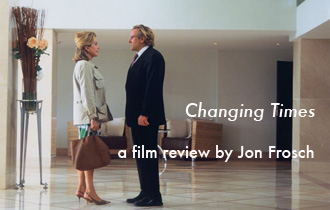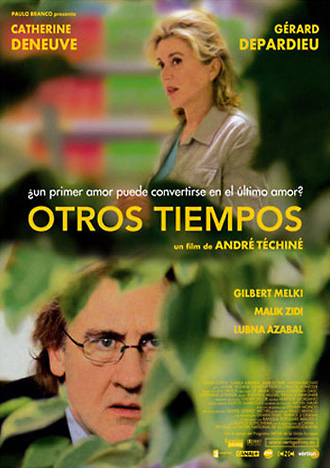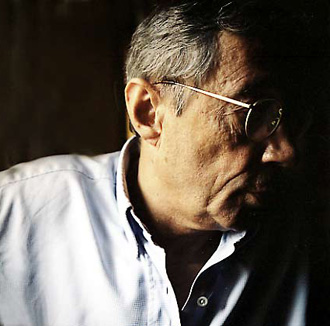Changing Times: a film by Andre Techine
03.08.06
 Even American cinephiles who salivate over each French film that comes out Stateside are usually unfamiliar with the great French filmmaker André Téchiné. His movies have regularly featured recognizable French stars like Catherine Deneuve, Daniel Auteuil, Juliette Binoche and Emanuelle Béart. He’s made, arguably, both the very best contemporary film about adolescence, Wild Reeds, and the very best contemporary film about a sibling relationship, My Favorite Season. And most of the director’s work (minus his first few films) has been released in major American cities and garnered critical acclaim. Yet Téchiné has never enjoyed the “it” status that other French filmmakers such as François Ozon or Jean-Pierre Jeunet have (however fleetingly) basked in.
Even American cinephiles who salivate over each French film that comes out Stateside are usually unfamiliar with the great French filmmaker André Téchiné. His movies have regularly featured recognizable French stars like Catherine Deneuve, Daniel Auteuil, Juliette Binoche and Emanuelle Béart. He’s made, arguably, both the very best contemporary film about adolescence, Wild Reeds, and the very best contemporary film about a sibling relationship, My Favorite Season. And most of the director’s work (minus his first few films) has been released in major American cities and garnered critical acclaim. Yet Téchiné has never enjoyed the “it” status that other French filmmakers such as François Ozon or Jean-Pierre Jeunet have (however fleetingly) basked in.
Maybe it’s because his movies tend to be serious and demanding affairs—dense, intricate stories told with novelistic sweep and texture, brimming with ambiguities by turns frustrating and exhilarating. They almost always revolve around any combination of a handful of themes: thorny, complex relationships between family members, friends, or lovers; evolving ties between France and its former North African territories; erotic and romantic awakenings, both hetero- and homosexual; and coming of age through painful experience. Téchiné has claimed his work is not shaped by other films or artists, but by life itself—a statement that would be unbearably pretentious if it didn’t feel true. Indeed, the director’s movies often give the impression of overflowing, not with style or plot, but with character, atmosphere, and suggestion.
His latest film, Changing Times, is no exception. If it lacks the polish and depth of the very best Téchiné, it is nevertheless a fascinating piece of work: a messy, moving, vibrantly acted and shot drama about the ravaging and reinforcing effects the passage of time has on emotions, and the periods of transition that hold us suspended between two worlds.
The central premise of the film is almost impossibly corny: a schlumpy engineer named Antoine (Gérard Depardieu) arrives in Tangiers to direct the construction of a new media center, and, more urgently, to win back Cécile (Catherine Deneuve), a past flame with whom he has remained deeply and painfully in love. Of course, Antoine’s mission won’t be easy. Cécile now lives with Nathan, her younger, Moroccan-Jewish doctor husband (a terrific Gilbert Melki), hosts a French-Moroccan radio show, and carries herself with the slightly defensive briskness of a woman grown impatient with life.
Antoine, meanwhile, is not the only character who arrives in Tangiers looking to reconnect. Sami (Malik Zidi), Cécile’s and Nathan’s bisexual son, is in town from Paris with his troubled Moroccan-born girlfriend, Nadia (Lubna Azabal), and her young son, Said (Jabir Elomri). While Sami rekindles an affair with ex-boyfriend Bilal (a sensitive début by Nadem Rachati), Nadia tries in vain to meet up with her twin sister, Aicha (also played by Azabal, in a bravura double performance), a devout Muslim who works at McDonald’s and cryptically insists that she and Nadia should stay away from each other.
 The set-up is schematic—Antoine, Sami and Nadia are the hopeful seekers, while Cécile, Bilal and Aicha are the skeptics to be re-captured—but as always, the relationships Téchiné (along with co-scribes Pascal Bonitzer and Laurent Guyot) maps out are so complicated and lived-in that what unfolds on screen never feels overly-programmed. As a portrait of people torn between two lives, Changing Times is satisfyingly knotty, and even surprising. Téchiné doesn’t corner his characters into making decisions; instead, he shows how their conflicts awaken in them emotions that bounce around and fluctuate, gradually leading them down paths that are as inevitable as they are tenuous.
The set-up is schematic—Antoine, Sami and Nadia are the hopeful seekers, while Cécile, Bilal and Aicha are the skeptics to be re-captured—but as always, the relationships Téchiné (along with co-scribes Pascal Bonitzer and Laurent Guyot) maps out are so complicated and lived-in that what unfolds on screen never feels overly-programmed. As a portrait of people torn between two lives, Changing Times is satisfyingly knotty, and even surprising. Téchiné doesn’t corner his characters into making decisions; instead, he shows how their conflicts awaken in them emotions that bounce around and fluctuate, gradually leading them down paths that are as inevitable as they are tenuous.
Antoine’s seemingly ridiculous proposition of reviving their past love gets under Cécile’s skin, exposing, in turn, the fragility of her bond with Nathan. In an interesting twist, this is not a case of a married woman tempted by passion; Cécile admits that she has always desired the handsome Nathan more than she actually loved him. Deneuve peels away Cécile’s prickly layers to reveal a woman slowly succumbing, in spite of herself, to the promise of undying devotion. Antoine seems, at first, more like a conceit—the lovesick suitor—than a fully realized human being, but the character’s dogged ardor turns out to be the most authentic thing Depardieu has done in years. In one beautifully played scene, Cécile shows Antoine the cliff marking the geographical end of Tangiers and he responds by gently pointing across the Strait of Gibraltar to the foggy outline of Spain. Where she sees the finite, he sees a new beginning, and the direction of their relationship will be determined by Cécile’s willingness to give his optimism a chance.
The tensions consuming the other four major characters in the film are handled with equal delicacy. Sami’s on-again/off-again affair with Balil is sprung from a physical passion that he clearly doesn’t share with Nadia, yet his love for her and his commitment to helping her raise her son never wavers; he is perched between two romantic choices and simply does not feel ready—or perhaps even compelled—to choose. Nadia, meanwhile, is caught up in a different sort of dilemma, popping pills and sleeping away days to escape the guilt she feels about having left behind her sister (and, implicitly, her culture and religion) to build a life in Europe. If the Nadia-Aicha pairing is the most farfetched (how did the two sisters end up so different and so estranged?), it’s also the most cinematic: In one indelible moment, Nadia spies on Aicha at work (headscarf removed), staring at a literal double that she dares not approach. Like Sami and Cécile, Nadia is reluctant to give up her current situation, but can’t quite turn her back on the past either. There is selfishness in Sami’s vacillation, and recklessness in Nadia’s, yet Téchiné is that rare director who refuses to judge his characters or push us towards a judgment of them. Instead, he shows us how indecision can itself become the basis of a relationship, causing two people to cling to each other, as Sami and Nadia do, with the same kind of steadfastness that Antoine is offering Cécile.
 As these characters alternately reach out to and recoil from each other, another presence looms large over the action: the city of Tangiers. Hovering between the Western modernity of the project Antoine is there to oversee and the strict tradition embodied by Aicha, Tangiers is, like the people in the movie, alive with contradictions and ripe for change. It’s in some ways an obvious setting for the film, but Téchiné’s artistry transcends any sense of contrivance. The director’s previous effort, the World War II drama, Strayed, was an almost uncharacteristic study in precision and control, and here he seems to relish the chance to loosen his grip: his camera swoops down into Tangiers’ traffic and construction-clogged labyrinth, pans across its lush coastline where African migrants plan their way to Spain, circles the actors restlessly while they confront and comfort each other. The effect is one of constant motion; both the people and the city portrayed in the film may be in limbo, but they are also swept up in the onward movement of time and history, both personal and global.
As these characters alternately reach out to and recoil from each other, another presence looms large over the action: the city of Tangiers. Hovering between the Western modernity of the project Antoine is there to oversee and the strict tradition embodied by Aicha, Tangiers is, like the people in the movie, alive with contradictions and ripe for change. It’s in some ways an obvious setting for the film, but Téchiné’s artistry transcends any sense of contrivance. The director’s previous effort, the World War II drama, Strayed, was an almost uncharacteristic study in precision and control, and here he seems to relish the chance to loosen his grip: his camera swoops down into Tangiers’ traffic and construction-clogged labyrinth, pans across its lush coastline where African migrants plan their way to Spain, circles the actors restlessly while they confront and comfort each other. The effect is one of constant motion; both the people and the city portrayed in the film may be in limbo, but they are also swept up in the onward movement of time and history, both personal and global.
Changing Times is far from perfect, however. Certain stretches feel rushed and there are several unconvincing coincidences and a few loose ends that nag more than they intrigue. But here is a movie that is, from its opening shot to its last, utterly and often breathtakingly alive to its characters, to their emotions, and to the worlds they inhabit and struggle, with various degrees of will, to reconcile. It is also, for those unfamiliar with Téchiné, a new opportunity to discover an unsung hero of French cinema, a director whose work is infused with an uncommon generosity.
In its implications, Changing Times is finally closest in spirit to the director’s earlier masterpiece, Wild Reeds. In that film, Téchiné ultimately sees adolescents as the most resilient members of a society in an often jarring state of transformation; their relative lack of previous experience, coupled with their eagerness to gain new experience, gives them the flexibility they need to endure changes which threaten to break the more brittle adults, so sure of what they know and want. In Changing Times, everyone, regardless of age, is given the chance to bend towards a new and perhaps happier life. Whether or not this chance is seized upon is another story, but the filmmaker has the grace to view all of his characters, and the city of Tangiers, as works in progress. André Téchiné may never be trendy, but he is wise: Of course times change, he seems to tell us; and if people change with them, so much the better.
Changing Times opens in Los Angeles August 3 at the Landmark NuWilshire in Santa Monica and the Laemmle Sunset 5 in West Hollywood.